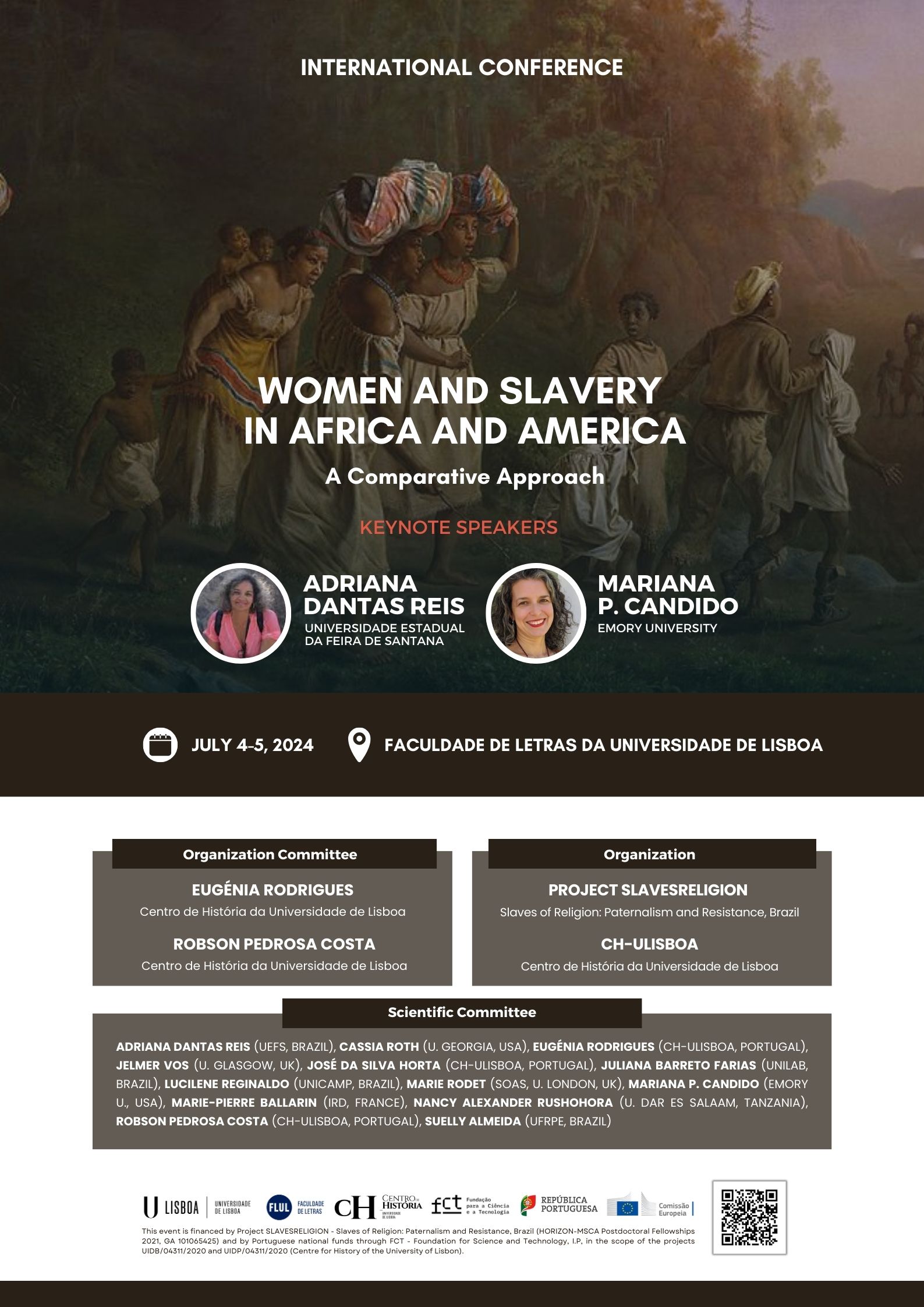International Conference
Women and Slavery in Africa and America: A Comparative Approach
Faculdade de Letras da Universidade de Lisboa | July 4-5, 2024
Contact | conferencewomenslavery@gmail.com
Organisers | Eugénia Rodrigues e Robson Costa
This event is organised and financed by Project SLAVESRELIGION - Slaves of Religion: Paternalism and Resistance, Brazil (HORIZON-MSCA Postdoctoral Fellowships 2021, GA 101065425) and by Portuguese national funds through FCT - Foundation for Science and Technology, I.P, in the scope of the projects UIDB/04311/2020 and UIDP/04311/2020 (CH-ULisboa).
Download CFP | Download Poster | Download Programme | Call for volunteers (alunos da FLUL)

Recent estimates indicate that 50 million people around the world live in modern slavery. Of these, around 22 million were subjected to forced marriages, among which 14.9 million are girls and women who were exploited, abused or raped by their own husbands. Despite efforts from international organisations, this number has continued to grow every year, thus hindering further action to overcome such subjugation and exploitation.
In America and Africa, the various measures to abolish slavery at different historical moments were met with ineffective legislation, a lack of political interest and pressure from local elites. In America, new forms of coercive labour replaced indigenous and African slavery, gaining new formats and different names throughout the 19th and 20th centuries. In the African continent, abolitionist policies collided with local practices, transformations in the bonds of dependence between masters and slaves, and imperialist interests that imposed new forms of unfree labour. However, in both continents, the experience of slavery varied, over time and place, depending on gender. Women and girls remained the main victims in slave and post-abolitionist societies, being more vulnerable to different forms of control and violence, such as capture, kidnapping, trafficking, donations, coercive marriages and labour exploitation. Nevertheless, it is important to highlight that they were also able to resist violence and oppression, using different strategies to reduce the weight of slavery on their lives.
However, Africa and America, in the diversity of their multiple regional and temporal contexts, have different trajectories. For instance, the concept of freedom has been understood differently. Bonds of dependence have gained peculiar dimensions and formats, despite carrying the exploitation of others in their essence. The notion of property had also been characterised by different understandings, with the principles of Roman law assuming greater weight in America. The fluidity of these concepts encourages comparative studies to help better understand the local trajectories of slavery in each continent, even if African women were enslaved in both geographies.
The objective of this conference is to discuss the multiple faces of slavery of women and girls in America and Africa, from a comparative, regional or local perspective. We welcome communications that address, among others, the following topics: sources for the study of slavery; theoretical and methodological perspectives; forms of enslavement; social, economic and political experiences; religion and slavery; life trajectories; forms of labour exploitation; marriage, family, childhood and motherhood; body and sexuality; slavery, rights and justice; slavery and material culture; intercontinental and regional slave trade; collective or individual resistance strategies; abolitionism; post-abolition societies; marginalisation and citizenship; social memories of slavery.
Keynote Speakers
Adriana Dantas Reis (Universidade Estadual de Feira de Santana) and Mariana P. Candido (Emory University)
Organizing Committee
Eugénia Rodrigues (Centro de História da Universidade de Lisboa, Portugal)
Robson Pedrosa Costa (Centro de História da Universidade de Lisboa, Portugal)
Scientific Committee
Adriana Dantas Reis (Universidade Estadual de Feira de Santana, Brazil)
Cassia Roth (University of Georgia, USA)
Eugénia Rodrigues (Centro de História da Universidade de Lisboa, Portugal)
Jelmer Vos (University of Glasgow, United Kingdom)
José da Silva Horta (Centro de História da Universidade de Lisboa, Portugal)
Juliana Barreto Farias (Universidade da Integração Internacional da Lusofonia Afro-Brasileira, Brazil)
Lucilene Reginaldo (Universidade Estadual de Campinas, Brazil)
Marie Rodet (SOAS, University of London, United Kingdom)
Mariana P. Candido (Emory University, USA)
Marie-Pierre Ballarin (Institut de Recherche pour le Développement, France)
Nancy Alexander Rushohora (University of Dar es Salaam, Tanzania)
Robson Pedrosa Costa (Centro de História da Universidade de Lisboa, Portugal)
Suelly Almeida (Universidade Federal Rural de Pernambuco, Brazil)
Secretariat
Arimilde Sofia Soares
Filipe Marques Fernandes
Organisation
Project SLAVESRELIGION - Slaves of Religion: Paternalism and Resistance, Brazil (HORIZON-MSCA Postdoctoral Fellowships 2021, GA 101065425); Centro de História da Universidade de Lisboa (UIDB/04311/2020; UIDP/04311/2020).

